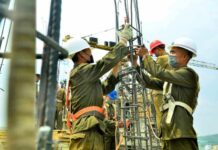
North Korean authorities subjected the Supreme Guard Command to ideological training following the assassination of former Japanese Prime Minister Shinzo Abe, Daily NK has learned. This suggests that North Korea is using Abe’s assassination to bolster its protection of the nation’s supreme leadership.
According to a high-ranking Daily NK source in North Korea last Friday, the Supreme Guard Command underwent an emergency ideological training session on the morning of July 9.
The lecture was suddenly held during a previously unscheduled hour before Saturday’s regular criticism session and divulged details about the Abe assassination.
The rush to educate personnel of the Supreme Guard Command about the assassination suggests that Pyongyang is sensitive about potential acts of terrorism against the country’s supreme leader, Kim Jong Un.
During the lecture, North Korean authorities explained in detail how Abe was killed, and called on personnel to “mercilessly crush the schemes of impure elements and become shields to build our fortress walls higher.”
The Supreme Guard Command also carried out unit-level workshops for three days and two nights, from July 9 to July 11.
With the North Korean military beginning its summer exercises from July 1, the Supreme Guard Command also included intensified drills for marksmanship, shooting, readiness inspections and manhunting on top of their existing training regimen, the source added.
Abe’s assassination was also mentioned in a party newspaper read by Central Committee cadres and the top leaders of regional party committees.
Abe’s killing has not been mentioned in the Rodong Sinmun, which ordinary North Koreans read. However, the Chamgo (Reference) Sinmun — a daily paper printed by the Central Committee that publishes articles about international affairs in their original form — reported the killing in detail.
All in all, while the regime has refrained from openly publishing news of the assassination – ostensibly out of fear of giving people an example to emulate – the government appears keen to make top cadres aware of the importance of protecting the life of the nation’s supreme leader.
Cadres who read about Abe’s killing in the Chamgo Sinmun were reportedly shocked that an ordinary citizen could shoot a former prime minister, and expressed concern about what would transpire if something like that happened in North Korea.
On top of making no mention of the killing in media outlets read by the general public, North Korean authorities have yet to publicly express an official position regarding Abe’s assassination.
North Korea designates Japan as a sworn enemy and imperialist state, and in the past employed colorful language to refer to Abe, calling him an “idiot,” “underwit” and “deformed child.” This suggests that Pyongyang is not likely to issue an official statement expressing condolences over Abe’s death or that condemns his killing.
Please direct any comments or questions about this article to dailynkenglish@uni-media.net.

















